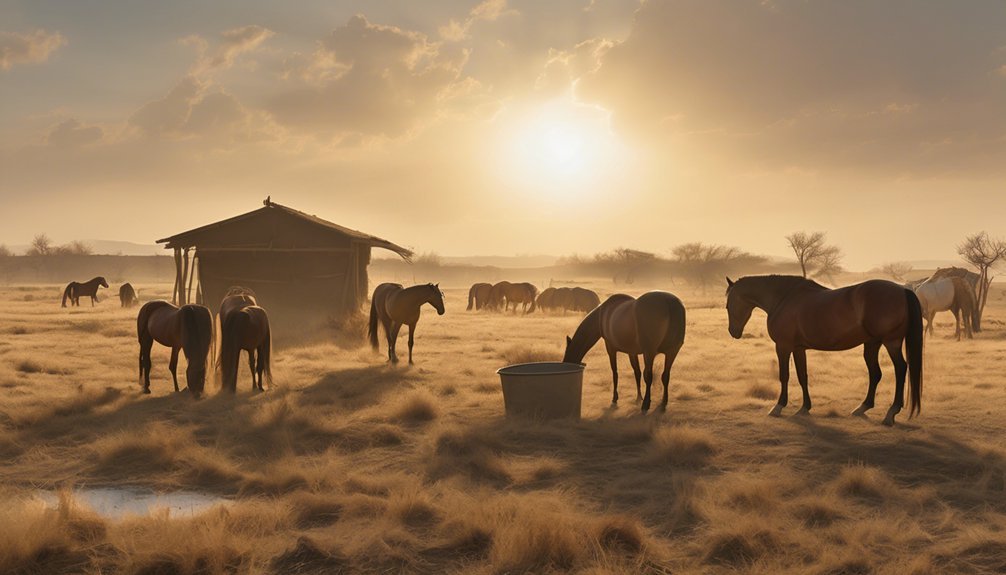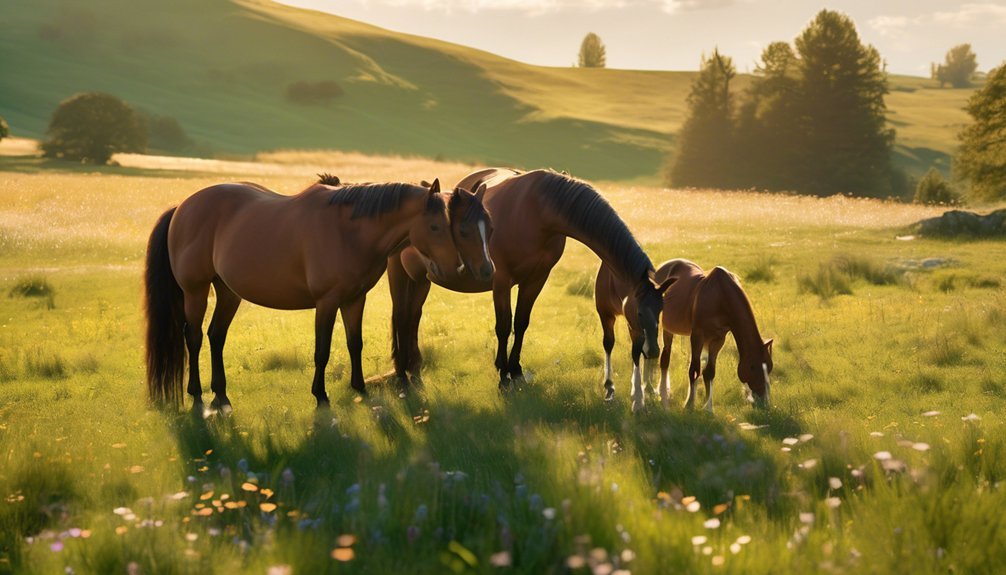
Did you know that heat can significantly alter your horse's nutritional needs beyond just increasing water intake? As temperatures rise, horses may experience decreased appetite, which can impact their overall health and performance. Understanding how to adjust their diet and feeding strategies is essential for maintaining energy levels and preventing dehydration. This leads to critical considerations regarding feed types, schedules, and supplementation that can help your horse thrive during the hot summer months.
Key Takeaways
- High temperatures can decrease a horse's appetite, necessitating lighter, more digestible feeds to maintain energy levels.
- Providing high-quality forage is essential for hydration and nutrient intake during hot weather.
- Smaller, more frequent meals can aid digestion and prevent overheating in summer conditions.
- Electrolyte balance is crucial to support hydration and muscle function, especially after intense workouts.
- Regular monitoring of hydration and nutritional adjustments is vital to prevent heat-related health issues.
Understanding Heat Stress in Horses

As temperatures rise during summer, understanding heat stress in horses becomes crucial for maintaining their health and performance.
Heat stress occurs when your horse's body struggles to regulate its temperature, leading to fatigue and decreased performance. To combat this, implement heat acclimatization strategies, like gradually increasing your horse's exposure to high temperatures. This helps them adapt more effectively and reduces stress.
Additionally, prioritize stress management techniques, such as providing ample shade, fresh water, and scheduled rest periods during intense training sessions.
By recognizing the importance of these strategies, you can help your horse thrive in the heat, ensuring they remain energetic and healthy throughout the summer months.
Signs of Dehydration and Heat Stress
Recognizing the signs of dehydration and heat stress in horses is vital for their well-being during the hot summer months.
Watch for dehydration symptoms like dry gums, sunken eyes, and a decreased skin elasticity; these can indicate your horse isn't getting enough fluids.
Additionally, heat stress indicators include excessive sweating, a rapid heartbeat, and signs of lethargy. If your horse acts agitated or shows a reluctance to move, it might be suffering from heat stress.
Keeping a close eye on these signs allows you to take swift action, ensuring your horse stays healthy and comfortable.
Regularly offering water and providing shade can help prevent these issues, keeping your equine friend safe throughout the sweltering heat.
Impact of Heat on Horse Appetite
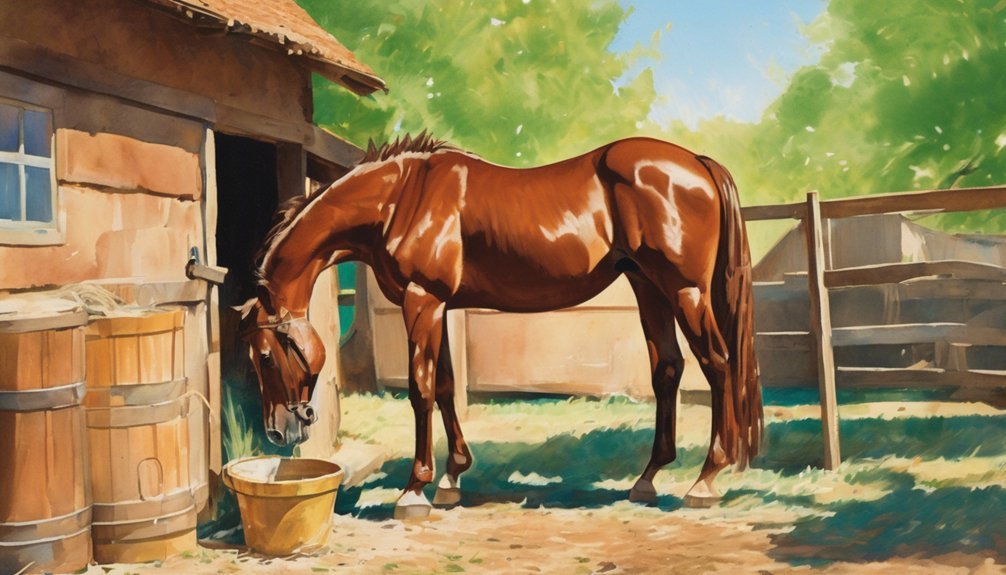
When temperatures soar, horses often experience a decrease in appetite, which can significantly impact their nutritional intake and overall health.
This heat-induced appetite decline can be attributed to various factors, including changes in metabolism and hydration levels. As your horse struggles with summer feeding challenges, you might notice them leaving grain or hay untouched.
This can lead to nutrient deficiencies over time, affecting their energy levels and performance. To combat this, it's essential to monitor their body condition and adjust feeding strategies accordingly.
Offering smaller, more frequent meals can help entice them to eat. Remember, maintaining a balanced diet during the hot months is crucial for your horse's well-being, so stay attentive to their changing needs.
Adjusting Feed Types for Hot Weather
To ensure your horse maintains optimal health during the sweltering summer months, adjusting feed types becomes essential. High temperatures can decrease your horse's appetite, making it crucial to consider feed alternatives that are more palatable.
You might opt for lighter, more digestible feeds, which can help maintain energy levels without overwhelming their system. Additionally, focus on forage quality; fresh, high-quality hay or pasture is vital, as it provides necessary nutrients while encouraging hydration.
Be sure to monitor your horse's weight and condition regularly. If needed, consult with a nutritionist to tailor a diet that suits their specific needs, ensuring they stay healthy, energetic, and comfortable throughout the heat.
Your horse deserves the best during these hotter months.
Importance of Electrolytes in Summer

Adjusting feed types is just one aspect of keeping your horse healthy during the summer heat; monitoring electrolyte balance is equally important. Your horse loses vital electrolytes through sweat, which can lead to imbalances affecting overall well-being.
Maintaining proper electrolyte levels supports summer hydration and optimal performance.
- Electrolytes help regulate fluid balance.
- They aid in muscle function and recovery.
- They prevent heat stress and fatigue.
Make sure to provide a balanced electrolyte supplement, especially after intense workouts or long rides in the heat.
Regularly check your horse's hydration status and adjust their electrolyte intake accordingly. By prioritizing electrolyte balance, you'll ensure your horse stays energized, healthy, and ready to tackle the summer season with enthusiasm.
Hydration Strategies for Horses
Ensuring your horse stays properly hydrated during the sweltering summer months is crucial for their health and performance. Implementing effective hydration techniques is essential. Provide fresh, clean water at all times, and consider adding electrolytes to encourage drinking. Monitor water access to ensure it's readily available, especially after exercise.
| Hydration Technique | Benefits |
|---|---|
| Frequent Water Checks | Ensures freshness |
| Electrolyte Supplements | Promotes thirst |
| Ice Water | Refreshing and cooling |
Additionally, encourage your horse to drink by offering water in a familiar bucket. You might also add flavor enhancers to entice them. By taking these steps, you can help maintain their hydration and overall well-being throughout the hot summer days.
Feeding Schedule Adjustments
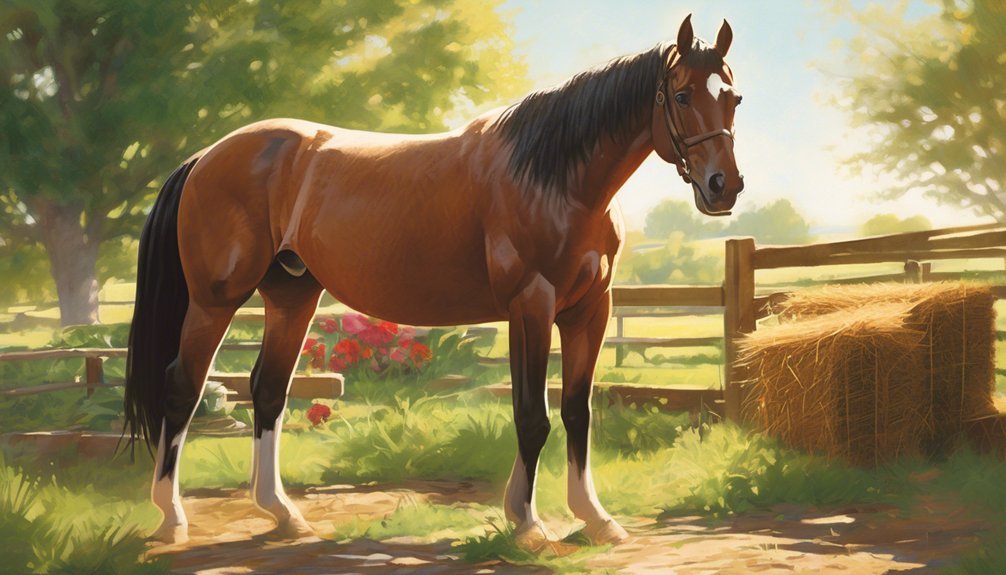
As temperatures rise during the summer months, adjusting your horse's feeding schedule becomes vital to maintaining their health and performance.
You'll want to consider altering feeding times and increasing meal frequency to prevent heat stress. Smaller, more frequent meals can aid digestion and reduce the risk of colic.
- Feed early in the morning or late in the evening to avoid peak heat.
- Increase meal frequency to three or four times a day to maintain energy levels.
- Ensure your horse has consistent access to fresh, cool water between meals.
Nutritional Supplements for Summer Health
Maintaining a balanced diet during the hot summer months often means incorporating specific nutritional supplements to support your horse's health.
You'll want to consider supplement types that focus on hydration, electrolytes, and digestive support. Look for products containing summer ingredients like electrolytes, which replenish vital minerals lost through sweat, and probiotics, which help maintain gut health during heat stress.
Omega-3 fatty acids are beneficial too, aiding in skin health and reducing inflammation. Additionally, vitamin E and selenium can boost your horse's immune system, crucial for combating the summer heat.
Monitoring Weight and Body Condition
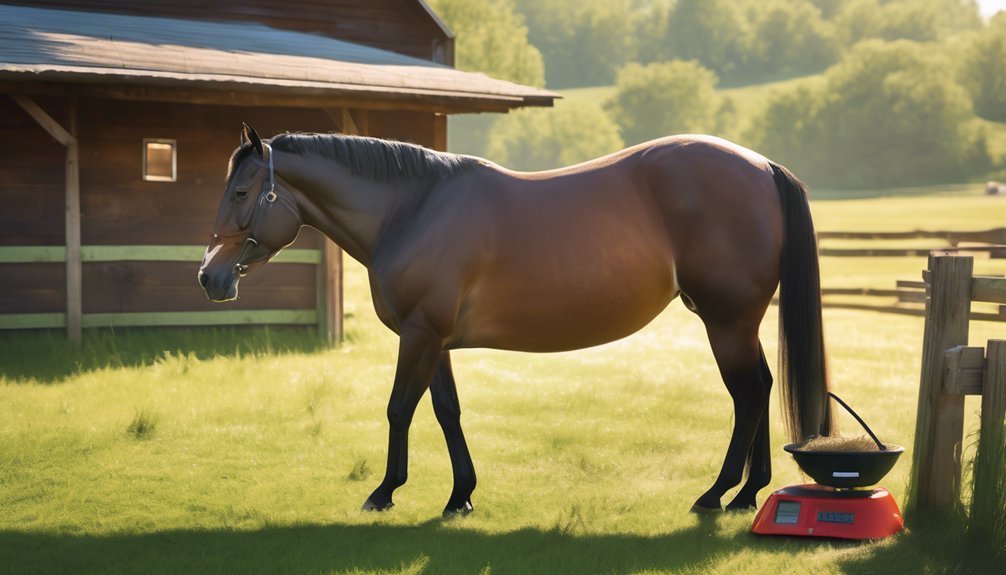
Monitoring your horse's weight and body condition during the sweltering summer months is crucial for their overall health and performance.
As temperatures rise, your horse's metabolism and nutritional needs can change, making regular weight monitoring essential. Keep an eye on their body condition to ensure they're not losing or gaining weight too rapidly.
Consider these key indicators:
- Ribs Visibility: Are the ribs easily visible, or is there a layer of fat covering them?
- Topline Shape: Does your horse have a defined topline, or does it appear sunken?
- Fat Deposits: Are there noticeable fat deposits around the neck and tailhead?
Special Considerations for Performance Horses
While heat can significantly impact your horse's overall well-being, performance horses face unique challenges that require special attention during the summer months.
As you focus on performance conditioning, remember that increased temperatures can lead to dehydration and electrolyte imbalances. During summer training, ensure your horse has access to fresh water and consider adding electrolytes to their diet to replenish what's lost through sweat.
Monitor their energy levels closely; high heat can affect their stamina and performance. Adjust your training schedule to cooler times of day and incorporate rest periods to avoid overheating.
Lastly, consider lighter, high-quality feeds to maintain their nutritional needs without overloading their system, ensuring they remain competitive and healthy throughout the summer season.
Frequently Asked Questions
Can My Horse Still Exercise During Extreme Heat?
Yes, your horse can still exercise during extreme heat, but consider lowering exercise intensity. Implement effective hydration strategies, like providing fresh water and electrolytes, to ensure your horse stays safe and healthy during workouts.
How Can I Tell if My Horse Is Too Hot?
When the sun blazes like a relentless fire, watch for signs of heat stress in your horse: excessive sweating, rapid breathing, and elevated heart rate. These temperature signs reveal your horse's struggle against the scorching heat.
What Are Safe Cooling Methods for Horses?
To cool your horse safely, consider using ice therapy on pulse points and giving water baths. These methods effectively lower body temperature, providing relief during hot days while ensuring your horse stays comfortable and healthy.
Are Certain Breeds More Heat-Sensitive Than Others?
You might think all horses handle heat equally, but heat-sensitive breeds like Arabians and Thoroughbreds often struggle more than others. Breed comparisons reveal distinct variations in heat tolerance, emphasizing the need for tailored care during hot weather.
How Does Humidity Impact My Horse's Health?
Humidity effects your horse's health significantly. High humidity can hinder cooling and increase sweating, leading to dehydration. Implement hydration strategies, like frequent water access and electrolyte supplements, to keep your horse comfortable and healthy in humid conditions.
Conclusion
In summer, you must adapt your horse's nutrition to combat heat stress. By prioritizing lighter feeds, ensuring hydration, and adjusting feeding schedules, you can support their well-being. Monitor their weight and body condition closely, and don't forget the importance of electrolytes. With these strategies, you'll not only help your horse cope with the heat but also enhance their performance and overall health. Stay vigilant, stay proactive, and keep your horse thriving through the summer heat.



